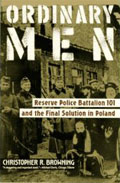 I read Elie Weisel’s Night as part of a literature class in 11th grade, and ever since, I’ve been drawn to Holocaust literature. It’s not fun stuff to read. It’s pretty horrifying. What draws me? Probably the question which thunders to the forefront with each book: “How could people do this?”
I read Elie Weisel’s Night as part of a literature class in 11th grade, and ever since, I’ve been drawn to Holocaust literature. It’s not fun stuff to read. It’s pretty horrifying. What draws me? Probably the question which thunders to the forefront with each book: “How could people do this?”
How, indeed. But they did. And they could do it again.
Two weeks ago I finished Ordinary Men, an astounding book which focuses on a reserve police battalion–ordinary men holding ordinary jobs, most too old for the regular army–who got called up as reserve policemen and stationed in Poland. There, they participated in the deaths of 85,000 Jews, either directly executing them or herding them into trains bound for Treblinka and Sobibor.
The author asks:
How did these men first become mass murders? What happened in the unit when they first killed? What choices, if any, did they have, and how did they respond? What happened to the men as the killing stretched on week after week, month after month? [What were] the personal dynamics of how a group of normal, middle-aged German men became mass murderers?
The author magnificently weaves the recorded testimony of numerous men (they went on trial in the 1960s) into a chilling narrative.
In most Holocaust literature and movies, Germans are portrayed almost as caricatures–all without conscience, all Jew-haters, all capable of great evil. But the people who carried out the policies of the true-believer ideologues at the top (Hitler, Himmler, and company) were ordinary people much like you and me caught up in unimaginable events.
This book humanizes the Germans of Reserve Police Battalion 101. You see men who refused to take part in mass executions, and who were excused from doing so. You see Germans leading small groups of Jews into the woods, where they made them lay on the ground, stuck the bayonet at a point on their neck, and then fired in unison. One German killing one Jew, and then they go for another batch. After a few rounds of this, you see soldiers approaching officers and saying, “I can’t do this anymore,” or even just wandering off. You also see reservists who enjoyed what they were asked to do, and you see civilians who wanted to know when the next roundup of Jews would occur, so they could come watch.
Interestingly, “No one could document a single case in which Germans who refused to carry out the killing of unarmed civilians suffered dire consequences.” This was the conclusion of prosecutors in the 1960s, after two decades of trying Nazi war criminals. Ordinary Men focuses a lot on this. You see the peer pressure, the feeling among the solders that they had to “do their part” in the dirty work of executing Jews, and to leave it to your comrades was to let the unit down. But nobody was penalized; they were just given some kind of alternate duty not directly involved in killing. “The battalion had orders to kill Jews, but each individual did not….Since the battalion had to shoot even if individuals did not, refusing to shoot constituted refusing one’s share of an unpleasant collective obligation.”
Anyway, this was a fabulous book with new insights for me. It resonated with my perceptions of how people think and behave, and I can better understand how ordinary people can be caught up as collaborators in horrible atrocities.





